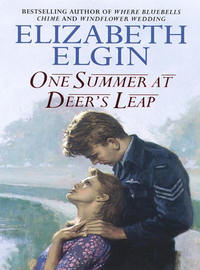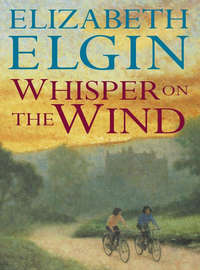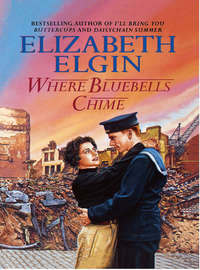
Полная версия
Daisychain Summer
Mary sniffed and dabbed an escaping tear. Things would never be the same; the war had seen to that – taken all the straight and decent young men and sent back men old before their time and unwilling ever again to speak of France. And they had been the lucky ones …
‘There you are,’ she snapped as her young man appeared from behind the stable block, face red with running. ‘I swear you do it on purpose, Will Stubbs! One night you’ll come here to find me gone!’
‘Sorry, lass. Young lad from the GPO got himself lost round the back of the house – a telegram for Miss Julia. Had to sort him out.’ Telegrams were always delivered to the front door, parcels to the back.
‘A telegram?’ Mary forgot her pique. ‘From France, was it?’
‘Now how would I know? I didn’t ask and if I had, he wouldn’t have told me. So say you’re sorry for being narky and give us a kiss, like a good lass.’
Julia MacMalcolm had learned to dread the small, yellow envelopes since the day, almost, she had fallen in love. They had rarely brought happiness; rather disappointments and death in their terse, cruel words. That day in France they had been laughing with disbelief and weeping tears of pure joy; even dear, straight-laced Sister Carbolic had joined in their unbelieving happiness. The war was over! No more broken young bodies, blinding, killing. Their harsh hospital ward had shone with a million sunbeams, that November day. Over! Soon, she and Andrew would be together and nothing and no one would part them again.
Then the telegram came in its small, yellow envelope. Andrew dead, six days before the Armistice. She didn’t just dread telegrams. She hated them.
‘Probably good news, from France,’ Miss Clitherow had smiled, though her eyes were anxious.
‘Of course.’ It would have been kinder, could her mother have phoned. One day, people said, it would be as easy to telephone from France as it was to ring up the grocer – but until then …
She slit open the envelope. She should have known, she supposed. And hadn’t she expected it?
Aunt Sutton passed peacefully away. Returning immediately. It was signed Sutton.
‘No!’ Julia handed over the telegram. ‘Read it …’
‘I’m sorry. So very sorry. What can I do – say – to help?’
‘Nothing, Miss Clitherow.’ From which Sutton had the telegram come? Which – or both? – was returning immediately, and when? What was she to do?
‘What will happen, Miss Clitherow? Surely they’ll bring her home to Rowangarth?’ Tears spilled from her eyes and she shook her head in bewilderment. ‘And did they get there in time, I wonder.’
‘The telegram was sent a little after noon; see – the time on it …’
‘Then they would be there, with her?’
‘Be sure they would, Miss Julia. Now let me ring for tea for you and then, perhaps, it might be wise to telephone Pendenys.’
‘No. Uncle Edward is in France, remember, and Aunt Clemmy and Elliot are in London. We’ll have to wait – stay by the phone; they’ll ring, once they get to Dover. And no tea, thanks.’ She strode to the dining room, pouring a measure of brandy, drinking it at a gulp, pulling in her breath as it hit her throat.
Rowangarth was plagued. First Pa, then the war and now Aunt Sutton – accidentally, and before her time.
She slammed down the glass, running, stumbling up the stairs to the little room where Drew lay asleep. Drew was all right. She drew in a shuddering breath. What was there to do, now, but wait? Andrew, I need you so …
She closed the door quietly, trying to ignore the ringing of the doorbell. Let Tilda cope with it. She wanted no more bad news, no intrusions into her sudden grief. She wanted to weep, to cry out her sorrow – but in whose arms?
She walked slowly, reluctantly, down the stairs, then ran into the welcoming, waiting arms she had so longed for.
‘Nathan! How I need you!’ Her cousin, thinner than ever, his skin bronzed by the African sun.
‘Tears, Julia? What is it, old love?’
‘Oh, my dear! You just home and to such sadness.’ She hugged the young priest to her, giddy with relief. ‘But you are always around, somehow, when I need you. Come inside, won’t you?’ She pushed the crumpled telegram into his hands, then placed a hand over her mouth. ‘Sorry. Brandy. I needed it …’
‘Always around? But I came because when I got home they told me Pa was in France and Elliot and mother in London. Thought I’d come here, and find out what’s going on.’
‘Read it, Nathan.’
‘I’m sorry.’ He reached out, gathering her to him again. ‘I know how deeply you cared for Aunt. Is that why Pa is in France?’
‘Yes, and mother, too. Injured, the telegram said. They went at once.’
‘All right, love. Let it come.’ He had taken it calmly, but a priest must soon learn to cope with grief. ‘Then tell me, uh?’
‘There’s nothing to tell. Monsieur Bossart sent the telegram; Mother and Uncle Edward would get there late last night. I was waiting – for good news.’
‘You’re cold, shaking. Come and sit down. I’ll put a match to the fire.’
‘Don’t go, Nathan? Stay with me? I can’t cope with this. Stay at Rowangarth, tonight?’
‘Of course I will. Not a lot of use being at home, come to think of it; no one there. I’ll just nip back to Pendenys and pick up a few odds and ends. Won’t be long. We’ll have a pot of tea when I get back. Chin up, Julia?’
Gently he kissed her forehead. Always there when she needed him? And he always would be, just as he would always love her, though please God she would never know.
‘Only be a few minutes,’ he smiled. ‘And then I hope to meet my godson. He’s well?’
‘Drew’s fine – wonderful – walking and talking. But hurry back, Nathan – please?’
8
Exactly on time the train from King’s Cross to Edinburgh pulled into York station and Julia wished she could have brought Drew to see the thundering green monster that hauled it. But her mother was returning from France and it was not a day for watching trains.
‘Dearest!’ Julia saw her at once; saw sorrow in her face, the sorrow they all felt.
‘Oh, my dear! Awful. So awful.’
‘Hush, now.’ Julia took her hand, holding it tightly. ‘The Holdenby train is already in. Let’s get ourselves settled.’
With luck they would find an empty compartment and her mother could pour out the heartbreak she had carried with her from the bedside of a dying woman.
‘I spent last night in London,’ Helen offered when they were seated on the train that would take them to the tiny, one-line station. ‘I wanted to get back, but –’ It had been her instinct to make like a small, bewildered animal for the safeness that was Rowangarth, but there had been things to do. ‘I went to see Anne Lavinia’s solicitors, you see – and her doctor. Only when I told him she had died, would he tell me.’
‘I know Aunt had seen him last time she was in London, but she made nothing of it.’
‘Well, it wasn’t nothing. She had a serious heart condition; she shouldn’t have been riding that great strong horse. Probably that was why she took a tumble. She didn’t regain consciousness – died not long after we got there.’
‘She went the way she’d have wanted to.’ Julia’s mouth was right with hurt. ‘Will it be in France?’ She couldn’t say the word; not burial.
‘No. We want to bring her home. She was born at Rowangarth and your Uncle Edward and I want her in the Sutton plot. She’ll be near your Pa. When all the French formalities have been seen to, Edward will come home with – with her.’
‘When?’ The train began to move. Julia looked out to see the Minster towers, blinking her eyes against tears.
‘A week today, I think it will be. I’ll have to see the vicar. Sad that it couldn’t be Luke to do it.’
Luke Parkin had a kindly way at burials; gentle-voiced, so those who stood at Holdenby gravesides drew comfort from his compassion. Poor Luke.
‘Mother – I don’t want that vicar!’ Not the locum; Luke Parkin’s stand-in, Julia called him derisively. ‘Nathan is home – why can’t he read the service? There’s nothing in canon law, surely, that says he can’t?’
‘Oh, but I’d like that. Your aunt would have, too. I phoned Cheyne Walk, by the way. Clemmy and Elliot will come back to Pendenys, of course, when I can give them a date.’
‘Of course.’ Julia didn’t want Elliot at the funeral; not standing there, imitating sorrow. And why should he be alive and Andrew dead? ‘Try not to be upset, mother. You know how Aunt Sutton loved horses …’
‘Yes, I do. Her solicitor holds her Will, by the way. He wants to see you, Julia.’
‘Yes – but not yet.’ That she was her aunt’s sole beneficiary had not slipped her mind, though now it seemed less important than on the day she had learned of it. Just a few days after their wedding, it had been. She and Andrew hadn’t had a honeymoon – not the usual one, because of the war – but 53A, Little Britain had been an enchanted place. Andrew’s cheap lodgings near St Bartholomew’s church had seen their first, fierce loving. She still paid the rent on those rooms; couldn’t bear to let them go. Now, she had two London addresses and decisions would have to be made.
‘Try to make it soon, dear. He said things had best be settled quickly. He’s putting her death in The Times obituary – save me the trouble, he said.’
‘He’ll charge for it, you know.’
‘Doubtless he will but oh!’ Helen covered her face with her hands. ‘It seems that life is slipping away from me. Everyone I love, leaving me one by one.’
‘But there’s me, and Drew. We won’t leave you.’ Julia smiled as the train hooted three times as it always did when it neared the bend, half a mile from Holdenby station. ‘And we are almost home, now.’ Soon they would be back within the shelter of Rowangarth’s dear, safe walls and things would not seem so bad. ‘Chin up, dearest.’
Alice waited in the village shop that was also a Post Office and telephone exchange, glancing up at the clock almost every minute, wondering what could be so important. Julia’s last letter had told her of Aunt Sutton’s death. Dear Aunt Sutton; such a fine lady. Indestructible, somehow. Alice had never linked her with death.
… I know how much you cared for her and I have ordered flowers for you, Alice. I will write a card, with your name on it. But there is something, more important, and I need you with me.
Is it possible Tom will allow you to come to London? I’ll telephone, and explain. Can you be at your Post Office at eleven, on Wednesday morning …
So now she waited, one eye on the clock, glancing all the while through the window at Daisy’s pram.
Julia had always been dramatic, always spoke before she thought. Marriage and widowhood hadn’t changed her. To her, everything was larger than life; her lows abysmally low; her highs acted out on a pretty pink cloud.
Alice had passed the letter to Tom who said of course she must go. Daisy would be no trouble, her being on breast milk and sleeping most of the time, though he’d heard London water was dirty, and best boiled – especially if a baby was to drink it.
‘It seems that Julia needs you urgent and a few days away will make a change from the quiet, here,’ he’d smiled. ‘Though by the time you get back, there’ll be someone in Willow End …’
‘It’s here, Mrs Dwerryhouse,’ called the postmistress from the switchboard at the back of the shop. ‘Just lift the phone, my dear. You’re through, caller,’ she said most professionally, then went to stand at the counter to let it be known she wasn’t listening in. And anyway, she’d be content with Alice’s half of the conversation.
‘Julia? What’s the matter? You’ve got me worried.’
‘Sorry, love. Didn’t mean to. But I’m coming to London. It’s Aunt’s funeral on Friday and I plan to travel down on Saturday. I’m her executor, you see – me and her solicitor. I’m seeing him on Monday. But could you come down, some time after that – I’d meet you at the station. Daisy will be all right. I’ll get hold of a pram and cot, for her. We’ll stay at Aunt Sutton’s. There’ll be plenty of room – but please come?’
‘Julia! Calm down! What’s so awful about seeing a solicitor that you want me there? What’s really the bother?’
‘Little Britain, if you must know. I’ve made up my mind to go there!’
‘To Andrew’s place? But you haven’t been there since he –’
‘No. Not since he died. You understand, Alice, so I want you with me. I’m not brave enough to go alone. Please tell Tom, so he’ll understand. I’m sure he’d let you come if –’
‘Oh, whisht! He’s already said it’ll be all right. I’ll travel on Sunday, though. Tom has most Sundays off, so he can see me and Daisy onto the train. There’ll be a couple of cases – nappies, and such like. But I’ll come, Julia. When I know the train times, I’ll write you. I’ll send the letter to Aunt Sutton’s – and yes, I do know the address! I’ve stayed there before, remember?’
‘I know you have. That’s why I need you with me. Bless you for coming – and say thank you to Tom, for me.’
‘Goodness, mother, I didn’t know a small boy needed so much paraphernalia!’ Julia put her head round the sitting-room door. ‘Be with you in a tick. Almost finished packing, then we’ll have a sherry. I think I’ve earned one!’
‘You could always leave him with me …’
‘Thanks, dearest, but no. He’s got to meet Daisy.’ And more important, Alice.
The door closed with a bang. Her daughter had never learned, Helen thought, the smallest smile lifting the corners of her mouth, to enter and leave a room in a lady-like manner. Only she could hurtle into a room, setting it into chaos at once, or leave with a door-slamming that set ornaments dancing.
Thank you, God, for Julia and Drew, she had whispered inside her as she stood at her sister-in-law’s grave. Had it not been for Nathan’s kindness, she must surely have broken down and sobbed, and that would never have done. So she had listened instead to the gentle, sincere voice reading the burial service – so like Luke Parkin’s, the poor dear man – and thought about anything save that Anne Lavinia was leaving them.
Another Sutton gone; one more from the good days, she had thought with pain; days that would never come back.
Things were changing. Now, young people danced all the time; an act of defiance, almost, to convince themselves that the fighting was over and never, ever, would they go to war again. So they laughed too loudly, some of them, and smoked too much and danced foxtrots and two-steps and lately, a dance called a Tango.
And young women cut their hair defiantly short and wore tight brassieres to flatten their breasts as if it were important they should look more like willowy boys than girls. Now, picture houses flourished, with two different films each week, even though there had never been such unemployment with mills and factories going bankrupt every day of the week.
Seaside outings seemed to have become essential and charabancs set out every Sunday morning as if everyone was frantic to live a little before people who should know better started another war.
I think, when the living is vacant, that Nathan should be our next parish priest. Helen directed her thoughts to the flower-covered coffin. It would be splendid to have Nathan with us. He’d be such a good influence on Drew; Drew needs a man, Anne Lavinia – even you, who had little time for men in your life, must agree. Maybe, even, Nathan could give Drew his lessons. I don’t want to send him away to school. Not as they had sent Robert and Giles away. So many precious young years gone, but they hadn’t known, she and John, that neither of their sons had so few years left to live.
I shall miss you, dear Anne Lavinia, but I will never forget you. Not John’s sister. Two of them gone, now. Only Edward left, of the three of them.
She looked over to where Edward and Clementina stood. Clemmy was heavily veiled; always went too far, when it came to a public show of grief. Jaws clenched, Edward stared ahead. Remembering, was he; thinking back to the way it had been at Rowangarth, when they were all little?
Ashes to ashes, dust to dust. Helen had stooped, taking a handful of Holdenby earth.
Goodbye, Anne Lavinia Sutton …
Once the train had come to a standstill, Alice laid Daisy on the seat, reaching for her cases, placing them one by one on the station platform. Then she scooped up her daughter.
‘We’re here in London and oh, it’s such a place you’d never believe it, Daisy Dwerryhouse!’
Carefully she stepped down, and then she saw them. Julia did not move nor take Alice into her arms, kiss her, say how glad she was to see her. Instead, her eyes spoke for her.
I’m sorry, they said. I know it shouldn’t have been this way, but try to understand?
A small boy held her hand. He was sturdy and he was fair. His hair was carefully parted and looked as if it had recently been combed. He hopped from one foot to the other, excited by the noise and bustle.
‘I had to bring him,’ Julia whispered. ‘I promised I would, next time I went on a train. And you’ve got to come to terms with the way it was.’ She held out her arms for Daisy. ‘Let me have her – show her to him?’
Bemused, Alice did as she asked, running her tongue round lips gone suddenly dry.
‘Drew, darling,’ Julia said softly, ‘this is my dearest friend, Mrs Dwerryhouse and this –’ she bent low so the small boy might see the child she held, ‘– is baby Daisy. Say hullo.’
‘Hullo, baby,’ he repeated obediently, then gazing up, he held out a small, gloved hand and whispered, ‘Hullo, lady.’
Alice looked down at her son; at the child of rape she had wanted never to love, and saw only a small boy, not yet two years old; saw Julia’s son.
‘Hullo, Drew,’ she said softly, bending down, cupping the small face in her hands. ‘You are so like Giles, except that you have Andrew’s eyes …’
The child pursed his mouth, frowning. Giles and Andrew were words he did not know and Mrs Dwerryhouse was a word too difficult to say. So instead he smiled brightly, pointing to the engine that still hissed steam and puffed coal smoke.
‘Puffing train,’ he said.
‘Nice puffing train,’ Alice nodded, kissing Julia warmly. ‘It’s all right, love. You’ve done well. He’s grown into a fine little boy.’
‘Let’s get a taxi.’ Julia closed her eyes briefly, relieved that the meeting of mother and son had gone better than she had dared hope, holding up a hand to call a porter. ‘Soon be at Montepelier Mews. Sparrow knew where to lay hands on a pram and cot.’
‘Sparrow? I’d forgotten …’
‘But she’s been looking after Andrew’s place for me – you knew that. I sent her the key to Aunt’s house – asked her to light fires, air the beds. She’s there, now.’ Emily Smith, who had cleaned for Andrew and devotedly washed and ironed his shirts. His cockney sparrow, he’d called her. ‘I send her wages each month – surely you remember? She still talks about Andrew as if he’ll soon walk through the door, back from Bart’s, and asking how her rheumatics are. It’s as if she wiped the war from her mind. Bless you for coming, Alice. It’s going to make going back to Little Britain so much easier.’
‘Do you have to go back?’ Come to think of it, did she have to keep up the lease on Andrew’s lodgings, act like Sparrow who tried not to admit he would never come home?
‘Yes, I do, but I’ll tell you about it when we get to Aunt’s house.’
‘Yours now, don’t forget.’
‘Not quite. Almost, though. Still a few things to be seen to before it’s legally mine. And I haven’t been in Hyde Park, yet. I was waiting for you …’
‘Then we’ll take the children there, tomorrow,’ Alice said firmly. What was Julia up to? Why the urgency of this visit? She offered her hand to Drew. ‘Come along, Drew. Take lady’s hand.’
Her eyes smiled into Julia’s. It’s all right, they said. At least my problem is solved – now let’s get you sorted out, Julia MacMalcolm!
Aunt Sutton’s little mews house behind Montpelier Place had changed little, Alice thought, since she had stayed there that enchanted May, seven years ago. Then, she had been maid and chaperon to Julia Sutton, her employer’s daughter, and never had she had such a time! It had been in nearby Hyde Park that Julia and Andrew met and –
‘Sparrow! Here they are! Here are Mrs Dwerryhouse and Daisy.’
Alice shook her head, blinking away the past, smiling at the small, thin woman who bobbed a curtsey then said, ‘Oh, the little love,’ to Daisy, who was, for once, wide awake and gazing about her with blue-eyed alertness.
‘Hullo. Am I to call you Sparrow, too?’ Alice hesitated.
‘Bless your life, mum, everybody else does! It was the doctor gived me the name and if it’s good enough for him, then who’s to say different? The kettle’s on the boil, Mrs MacMalcolm. You’ll both be wanting a drink of tea?’
Alice looked around her, remembering. The house was still pretty and white; white windows and doors, outside; white-painted woodwork inside, with white-painted furniture in a style popular at the turn of the century and Anne Lavinia Sutton had not thought to change. The house was full of greenery, then. Pots of ferns and trailing plants everywhere, though now there were none to be seen. Died from neglect, she supposed. ‘The plants?’ she ventured.
‘Mm. I shall have to buy more. I want it to be just as it was when Aunt lived here. Sparrow will see to them. She’s coming to live in, caretake the place – did I tell you?’
‘You didn’t – but it’s time for Daisy to be fed. Can I go upstairs?’
‘That you can, mum,’ Sparrow smiled. ‘The cot is made up and a warmer in it. And there’s a comfy chair for you to sit in. Anything you want, just call out. Sparrow’s here to take care of you all.’
‘She’s so pleased to be moving in here,’ Julia murmured as she watched Daisy feeding contentedly. ‘She’s a widow; her son was killed in the war, too. She’s only got the pound I send her each month for keeping an eye on 53A, and a few shillings a week pension. Hadn’t much to live on, when her rent had been paid. She’ll be a lot better off, when she lives here. Paradise, she says it will be.’
‘And will she still look after Andrew’s lodgings?’
‘No. I – I’m going to let the place go. The lease expires at the end of the year. I won’t renew it.’
‘I see. I think you’ll be doing the right thing, though it’s going to hurt, isn’t it?’
‘It’ll hurt like hell – as if I’m betraying him. That’s why I want you with me. I’m not brave enough to do it alone. You were with me the night Andrew and I met. You are a part of us. I want you to be there when I say goodbye.’
‘And I will be, though it won’t be goodbye, Julia. Just an acceptance that he’s gone. It won’t be easy. I didn’t want to let Tom go. And where is Drew?’ she demanded, eager to talk about other things.
‘Drew’s fine. He’s in the kitchen with Sparrow. He always finds someone to fuss over him. At Rowangarth he’s got Cook wrapped round his little finger – now it’s Sparrow. They’ve both got one thing in common – a cake tin filled with iced cherry buns.’ Julia was smiling again. ‘You do like him, Alice? Seeing him didn’t upset you, like it used to – bring it all back?’
‘No. I’m Alice Dwerryhouse, now. Drew is your little boy. And nothing that happened was his fault; I accept that, now. How is the adoption going?’ she murmured.
‘We-e-ll – I’ve been going to tell you about that. After a lot of thought – mostly by Carver-the-young – I think it won’t be so much an adoption as a change of legal guardian. Young Carver says it’s all that’s necessary and won’t be half so much fuss. Things are a bit behind, because of Aunt Sutton, but we’ll keep you au fait with everything. You aren’t going to change your mind?’
‘You know I won’t. Drew belongs at Rowangarth – it’s as simple as that. And one day, when they are older, we’ll tell them, won’t we?’
‘You and me both, Alice. One day …’







